AFRICA
home > projects > africa
Malawi 
5 SoyCow M’s and 230 SoyaKits at USAID Feed the Future
Agricultural Diversification Project - 2017-2019
In October 2017 Malnutrition Matters provided installation and training at five sites, near Lilongwe, Malawi for the 5 SoyCow systems. 4 of these systems are operated by rural cooperatives, plus one at Lilongwe Agricultural University (LUANAR). These sites efficiently produce soy foods for sale in their local communities, which improves nutrition and creates sustainable local employment. This work was done in conjunction with partners Palladium International and Soybean Innovation Lab (SIL).
230 SoyaKits were provided for use in rural areas around Lilongwe, by three local NGOs who work on women’s empowerment and malnutrition relief. The initial deployment of 30 SoyaKits took place in 2018, including with YONECO – Youth Net and Counselling, https://yoneco.org/ , as pictured below.
The affordable SoyaKit enables time-efficient and fuel-efficient production of high-quality soyfoods in a home kitchen and can form the basis of a part-time or full-time sustainable micro-enterprise. It enables women to earn an income and improve nutrition by providing protein-rich food in their communities.
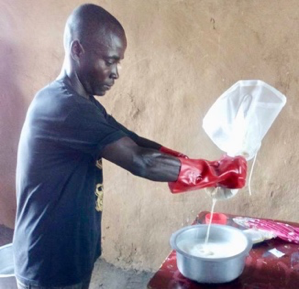

The additional 200 SoyaKits were deployed in 2019, including with Catholic Relief Services and their 4Children program, as illustrated below.

Toddler being given freshly made soymilk.
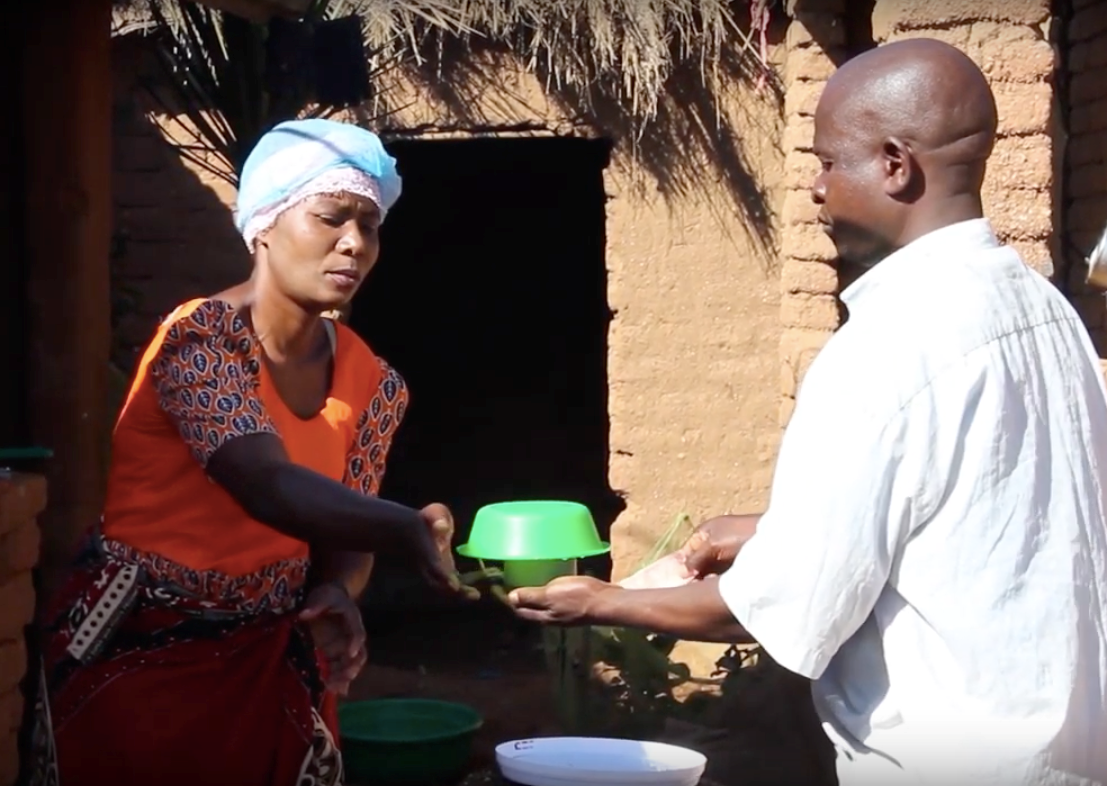
Entrepreneur Zione Charles selling soymilk to a neighbour in Chombakata village.

SoyaKit entrepreneur Promise Silesi grinding soybeans before cooking, in Chiuzila village.
2 VitaGoats and 13 SoyCow ‘M’ at DAPP Project Malawi 2010/2014
In September 2010 MM specialist Charles Lauzon provided installation and training at Chiradzulu, near Blantyre, Malawi for the 4 first 4 VitaGoat / SoyCow systems. These first 4 systems were provided to farmer groups that were part of the highly successful DAPP Farmers Club program. DAPP is a multinational NGO focused on nutrition, agricultural development and related projects. MM has provided equipment and tech support for their projects in Zimbabwe, Mozambique and Malawi. These four systems are in addition to four others in Malawi with another agency in the north of the country.

Classroom training including formulation and sampling of various soymilk products.

Trainees are shown producing milk with the SoyCow "M" which includes the electric grinder at the right rear of photo.
Based on the success of the first 4 systems in providing protein-rich soymilk to the local population, made from soybeans cultivated by the farmers, 11 more SoyCow systems were ordered in 2013, also as part of DAPP’s Farmer Club Program. This program works closely with the Ministry of Agriculture and Food Security in pursuing the objectives of its Agricultural Development Program. The idea of the Farmers Club Program is a nationwide mobilization of small scale farmers in a progressive production move towards prosperity. The structure of the program consists of 3,000 farmers organized into 60 Farmers Clubs – each comprising 50 farmers; these individual clubs provide a platform to address the larger development issues that have inextricable effects on farming and food security in Malawi.

Trainees in 2013 becoming familiar with the SoyCow equipment.

6 blocks of tofu weighing in at 2.1kg
Embangweni 2006/2009
Three VitaGoats set up in 2009 at schools including deaf school, high school and junior school. Students and staff operate systems daily for students and community.
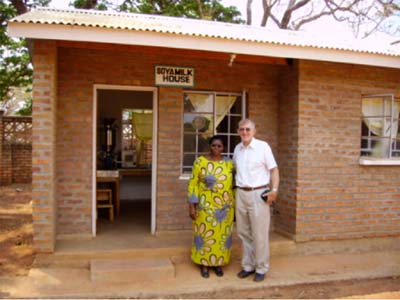
SoyCow at special production house at Embagweni Hospital This system has been running regularly since 2006 Dr. Grace Malindi and Robert Holloway - US sponsor of project.

Students at deaf school producing with VitaGoat. Lady in middle is Dr. Grace Malindi, Director of Malawi Government Agriculture Extension Services.
Ghana 
SoyaKit Project Launched in Ghana 2017 with Mennonite Economic Development Association (MEDA)
Sponsored by MEDA (Mennonite Economic Development Assoc.) this project is tied in with their GROW (Greater Rural Opportunities for Women) program in Northern Ghana. www.meda.org
In May, MM specialist Hart Jansson, arrived along with 30 SoyaKits which were previously consolidated in Accra. In the town of Wa, eleven trainers were trained in the use of the SoyaKit, to make about 7 L of soymilk per hour, and also derivatives such as yogurt, tofu and porridge. Some of these trainers then began a schedule of each training about 4 or 5 home-based entrepreneurs. This will be done over the course of two months, leading up to the dry season, following this current farming season, when they will be more focused on this new home-based side business. These farmer / entrepreneurs are each paying about $150 for their kits, which is approximately half of their expected “retail” value when available commercially in future. Each SoyaKit contains 12 components, including several key items such as manual grinder, heat retention cooking bags, commercial grade nylon filter bags, food grade plastic container (HDPE) and other required small-scale food processing items. Many of the kit components can also be used for other food processing.
The SoyaKit was developed with sponsorship from long-term MM supporter, Alpro CVA, Europe’s leading soyfoods producer. www.alpro.com

Rural Enterprises Program Phase III - 2016 (ongoing)

The REP III program, funded by the African Development Bank, the International Foundation for Agricultural Development and the Government of Ghana, and implemented by the Ministry of Trade and Industry in Ghana, is dedicated to economic development of the rural areas of Ghana. Malnutrition Matters had been involved in planning the program before its official launch in December 2014. Malnutrition Matters (MM) is proud to be one of the few official partners in the program. MM began its REP activities in mid-2016. SolarFlex and SoyCow equipment (with PedalPro option) were delivered to 10 sites in Ghana, as shown, in January, 2017. Installation and demonstrations by MM personnel was completed in May of 2017 and full operational and business training is scheduled for July. The production and sale of affordable soymilk and derivative products such as soy yoghurt, soy porridge and tofu will improve nutrition and enable sustainable operations creating employment in these locations. Some sites may partner with local entrepreneurs. The SolarFlex systems will be used and promoted for economical solar drying of food to reduce post-harvest losses and improve food security. Some additional SoyCow and SolarFlex equipment is intended to be produced at various Rural Technology Facilities in Ghana, after transfer of technology to enable local fabrication.
Mennonite Economic Development Association (MEDA) Project with IFDC Sept. 2014
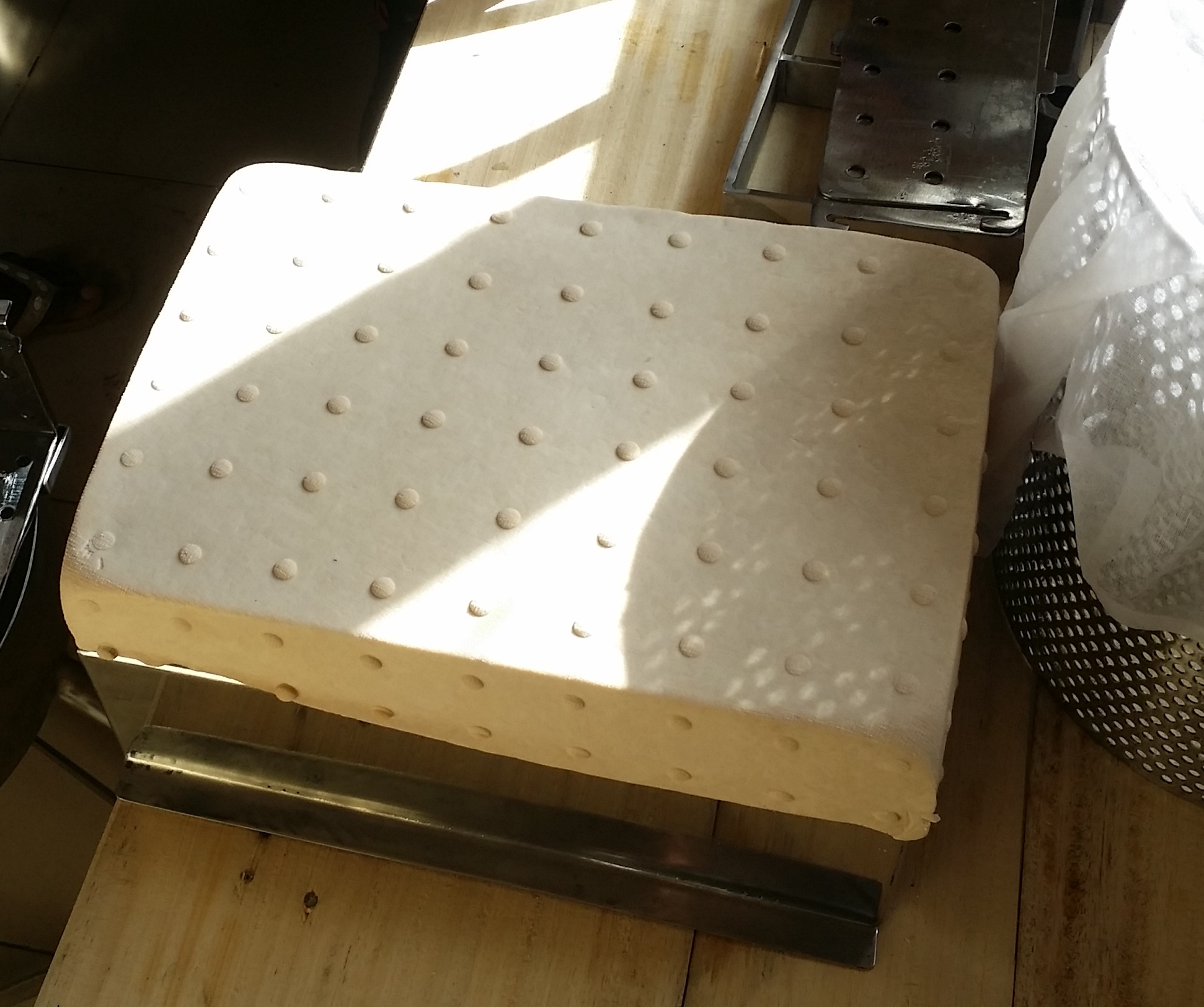
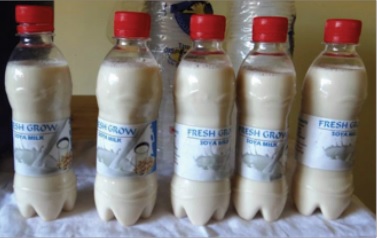
Soymilk being bottled at Agona Ashanti in Ghana (Prof. Osei, Proprietor)
Two SoyCows have been installed in northern Ghana, in conjunction with MEDA and IFDC. Both are being operated as self-sufficient micro-enterprises. The VitaGoat system option, with the PedalPro for non-electric processing, has also been installed in case of power failures etc. The MEDA-sponsored system located in rural Wa, operates as ‘Mr. Baaro Enterprise’ and the soymilk is hot-filled into plastic bottles, as shown. HIgh quality tofu is also being produced as per the photo of the 3 kg block produced by one batch of soymilk. The IFDC sponsored system is with an entrepreneur located near Tamale. This pilot initiative is operating under MEDA’s program, “GROW” - Greater Rural Opportunities for Women, which is funded by CIDA.
Golden Sunbeam School Project– Ghana 2014
With their recently installed SoyCow E (all electric), the Golden Sunbeam school, about 20 km from Accra, is producing 1500 servings of soymilk for their students every week. This SoyCow project was initiated and sponsored by Brigham Young University, led by Prof. Steven McGary. The soymilk is served in 300 ml plastic bottles, with some students buying it and some receiving it for free, depending on their family income.
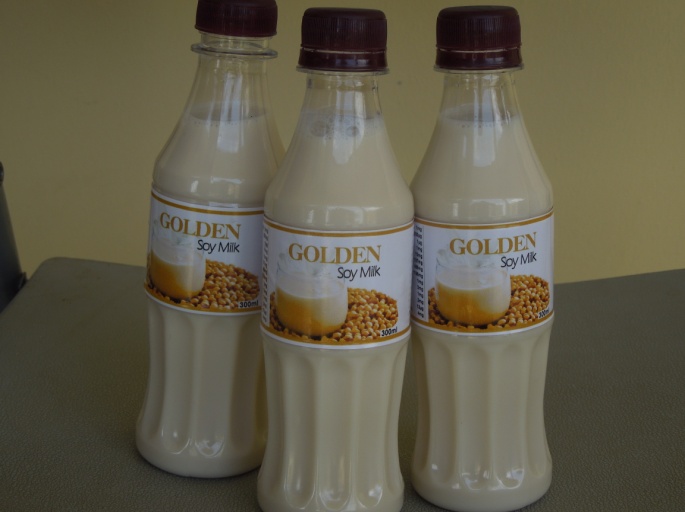

ADRA / World Soy Foundation, Valley View University Project, Techiman, 2009 / 2012
Originally launched in 2009, this project was upgraded in September of 2012. The SoyCow / VitaGoat system there now produces almost 200 liters of soymilk per day. Of this, 120 liters is delivered free of charge to four local schools so that about 450 children receive a daily serving of soymilk. The rest of the production is either sold to the university students in 250 ML bottles or made into tofu and used in the canteen.

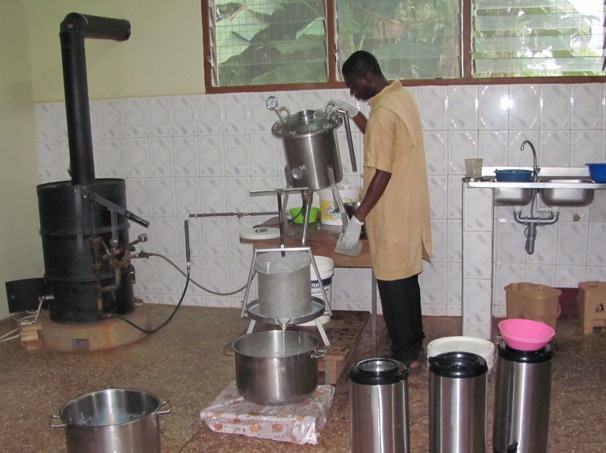
This project model demonstrates how a mixed enterprise can work, with some output donated for social feeding and some sold to help sustain the operation. The workers can also do overtime production for extra sales and income.
Uganda 
SESACO With 2 SoyCows
2018/2019
In Uganda SESACO has for many years been successfully producing soy yogurt for commercial sale. The company was founded in 1987 and now employs about 80 people. Up until August 2018, they were using one SoyCow E system, but recently they have installed their second one which gives them a total capacity of about 80 L per hour. Workers are shown with the twin SoyCow operation at the facility in Kyengera, outside of Kampala. SESACO is a multi-product soyfood company which also produces soy ice cream and analogs such as dry mixes and soy nuggets, soy coffee, snacks and baked goods. They also distribute imported soy flours and TSP and are planning further expansion for a larger facility for both local and export markets. www.sesacosoya.com

Semuto, Luweero Province | FXB Project, April 2007
Besides the production of soymilk, yogurt and "maas" (sour milk) are popular.In addition, the local ready supply of peanuts allows peanut butter to be made with the cycle-grinder. The photos show cycle grinding of soybeans and output of soymilk slurry from the cooker into the press. All done inside a shipping container, which is home to the VitaGoat production.
Funded by the Donner Canadian Foundation, a VitaGoat was installed at an FXB Uganda-supervised site in Semuto, Uganda, which is one of many countries where FXB has operations. In Uganda, FXB operates in Luweero province, which is 75 km northwest of Kampala. Their main focus is to help support AIDS orphans, to prevent HIV/AIDS and to provide treatment to those who are living with HIV/AIDS. FXB Uganda benefits tens of thousands in their community.
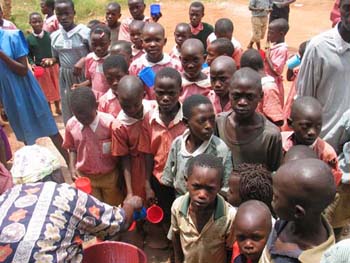
Local school children, many of them orphans, lining up for milk near Semuto.
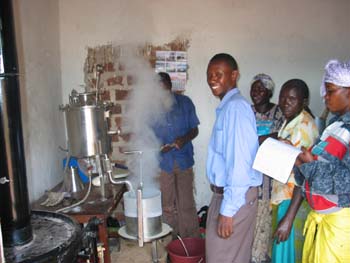
FXB Trainees showing off their newly acquired skills making soymilk near Semuto.
On the first day of the training session, three batches of soymilk were made. One batch of the Soymilk flavored with lemongrass, a local favorite. The local school children eagerly drank the milk and there was a lineup to get more. On the following day, three more batches of soymilk were also quickly consumed; the children also liked the milk when it was flavored with fresh locally supplied vanilla. This area will benefit immensely if they take full advantage of the large amount of milk which can be made in one day (100-200 litres), which could provide soymilk for at least 500 children and adults, as well as providing tofu to add to other meals, peanut butter, yogurt and processed fruits and vegetables.
Mozambique 
Winnua SoyCow Program – Mozambique 2015
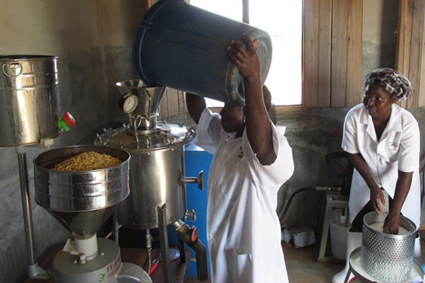
Women at Winnua SoyCow facility making soymilk.
Winnua is a socially responsible business involved in agricultural development in northern Mozambique. Their SoyCow program involves both a commercial and a humanitarian aspect. They sell bottles of soymilk and yogurt, but also distribute milk in bulk form to local schools. At present they are providing a daily serving to 1,200 children daily.
After more than a year, the monitoring shows three good results: More children enter school, a higher percentage of the children that enter do not drop out, and also their academic performance has improved. The health posting also confirms that the level of malnutrition has gone down in the village that receives the milk.
USAID Soy Innovation Laboratory (SIL) – Ghana and Mozambique 2014/2015
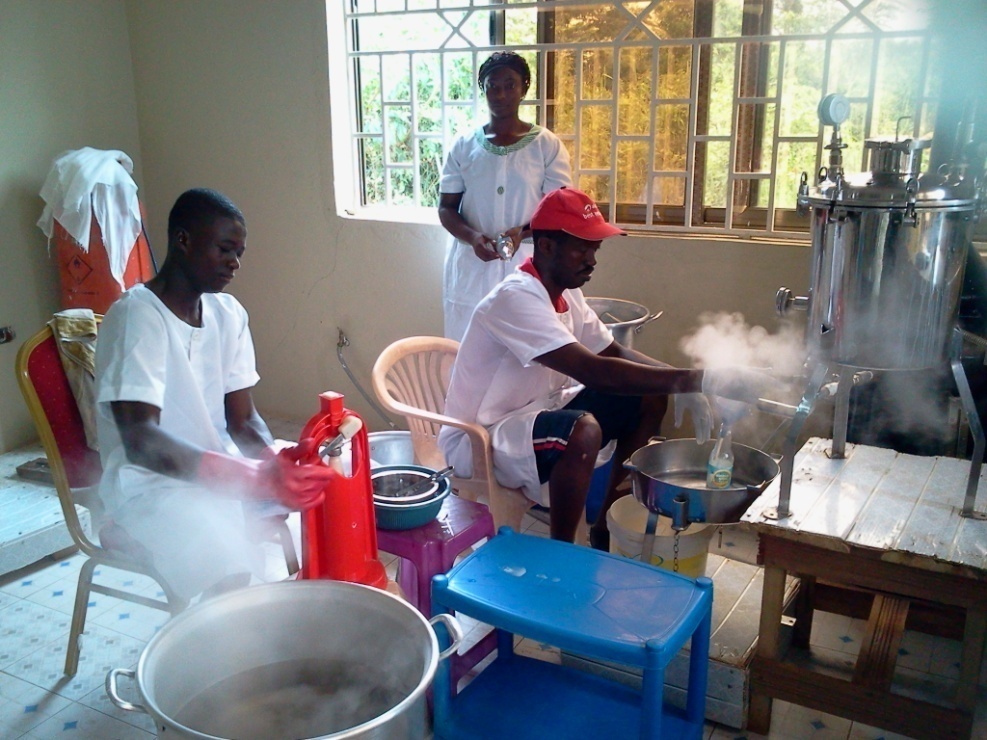
Soymilk being bottled at Agona Ashanti in Ghana (Prof. Osei, Proprietor)
As part of USAID’s Global Hunger and Food Security Research Strategy: Climate Resilience, Nutrition, and Policy, Malnutrition Matters is assisting the National Soybean Research Lab at the University of Illinois and WISHH, to implement a project called Feed the Future Innovation Lab for Soybean Value Chain Research.
This project is being implemented in Ghana and Mozambique. MM’s role is to provide small-scale soy processing equipment, operational training to produce soymilk and derivative foods, and marketing training for the micro-enterprises that will operate the SoyCow equipment. Three will be deployed in urban and village settings in Ghana, and two systems will be deployed in Mozambique. The three new SoyCows for Ghana will complement the four already operating there under the auspices of other projects; MM expects that Ghana will soon be leading Africa in the sustainable small-scale production of soy beverages. The picture shows soymilk production at Agona Ashanti, near Kumasi in Ghana. This site will be expanded under the SIL project.
MM is also excited to be expanding the small-scale soy production that is currently being introduced in Mozambique. Mozambique, with a recent emphasis on cultivation of soybeans primarily for animal feed, has great potential to maximize the benefit of soybean cultivation for the Mozambican people by using a substantial part of their soybean crop for direct, local human consumption.
Liberia 
OICI / Hands 2010-2015
Malnutrition Matters is one of several NGOs working with US-based prime contractor OIC International on the 5-year Health, Agriculture and Nutrition Development for Sustainability (HANDS) project funded by USAID. The objectives of the HANDS program are to eliminate the current food gap and nutritional deficit and to provide nutrition-related business training in two of the most food insecure counties of Liberia: Grand Geddeh and River Ghee. The HANDS program strives to help Liberians help themselves. Through technical training, and entrepreneurship and business development, OICI's HANDS project aims to develop Liberia's workforce. The incorporation of soy flour into the local food staple 'gari' and the village processing of soybeans into soymilk, will benefit over one hundred thousand Liberians over the next 5 years.
Malnutrition Matters' role is to provide installation and training with 9 VitaGoats and 21 Small Farm SolarFlex food dryers and to provide business training to the operators to enable them to operate the equipment as micro-enterprises. Sales of soymilk produced by women's groups have begun at the five initial VitaGoat sites.
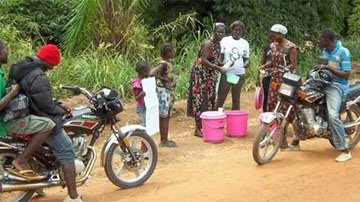
Women entrepreneurs selling freshly made soymilk at the roadside in Zwedru, Grand Geddeh County, Liberia , June , 2011
International Institute of Tropical Agriculture – 5 SoyCows 2014
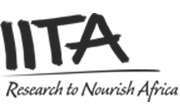

Agripeneur Youth trainees learning how to use the electric boiler on the SoyCow E, at the IITA-East Africa Hub, Tanzania-Mikocheni in Dar es Salaam
International Institute of Tropical Agriculture (IITA) is one of the world's leading research partners in finding solutions for hunger, malnutrition, and poverty. Their award-winning research for development (R4D) addresses the development needs of tropical countries. They work with partners to enhance crop quality and productivity, reduce producer and consumer risks, and generate wealth from agriculture.
As part of its N2Africa program, which promotes the cultivation and post-harvest processing of nitrogen fixing crops including soybeans, Malnutrition Matters has recently installed 5 SoyCows for IITA at various centers in Africa , including DRC, Tanzania and Nigeria. These SoyCows enable local production of soy foods for human consumption and facilitate training of entrepreneurs to produce protein-rich, yet affordable, soymilk and derivative foods. The IITA is implementing a program called Agripeneur Youth which provides entrepreneurial training for youth in agricultural pursuits.
A comment from one of the Agripeneur Youth: “We are ready to step into the competitive environment of Soy production market, … as global warming and environmental degradation is increasing, our call goes to the donor and other partners to educate youth on importance of environment conservation by supporting a healthy Soy crop production for human consumption, donors should also emphasis on educating youth on machine installation knowledge and so to educate on agripreneur marketing strategy as to make better Africa Soy productions.
Tanzania 
Bukoba 2013/2014
The Bukoba Women’s Employment Association (BUWEA) started growing soybeans in 2007. It is a group of women who farm together and look for value-added opportunities to increase employment in their town in northern Tanzania.
In 2008 they were taught how to make soy milk using small blenders. They were able to make 18 liters of soymilk in a week . BUWEA spent some years on training and educating people about the nutritional value of soy foods including giving brochures to villagers, teachers, clinic centers and in various offices. They started a school feeding program which was funded by donations. Three schools benefited from this program for six months and through measurement of height and weight of the students, a positive impact was shown.

Soy Products produced and sold by the BUWEA women entrepreneurs
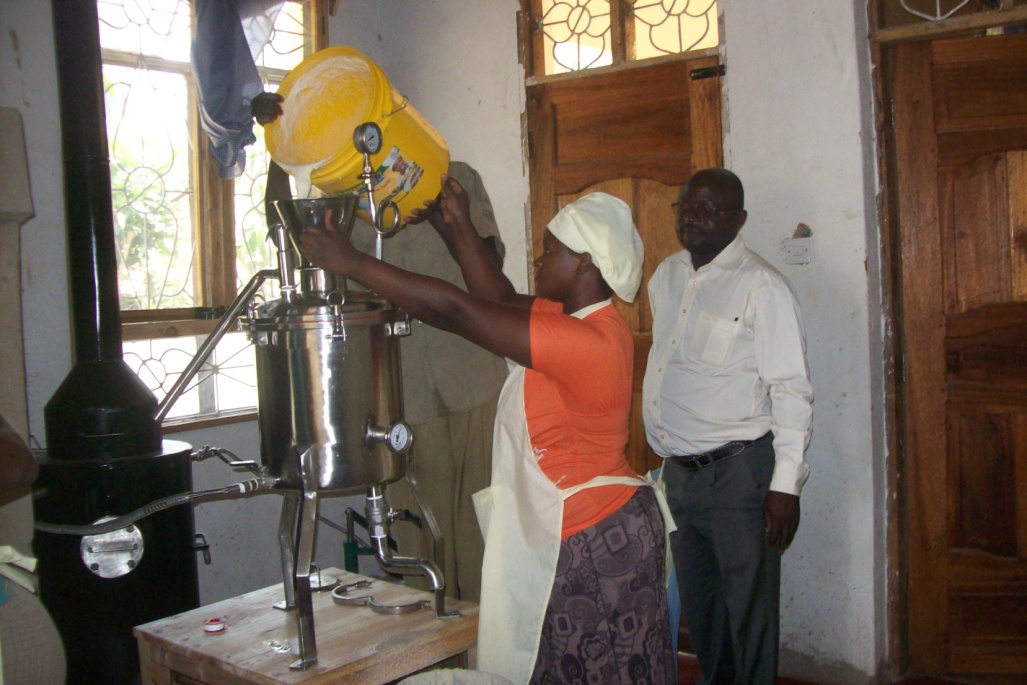
Woman trainee being supervised by MM Technician Tom Agalo
However, it was difficult to use small blenders so they were very pleased to learn about the SoyCow system. BUWEA procured a SoyCow system and started production in July 2013. BUWEA is selling one liter of fresh soy milk for 600 Tsh (Tanzanian shillings) and one liter of yoghurt is sold at 1200 Tsh. Production ramped up slowly from about 50 liters per week in 2013 to the current production of over 100 liters per week in 2014. Due to the success of the SoyCow, MM installed a second system in 2014, at the request of BUWEA.
Kenya 
Small Farm Dryer at SOFDI, in Kenya - 2016 (Sponsored by A Better World AG)

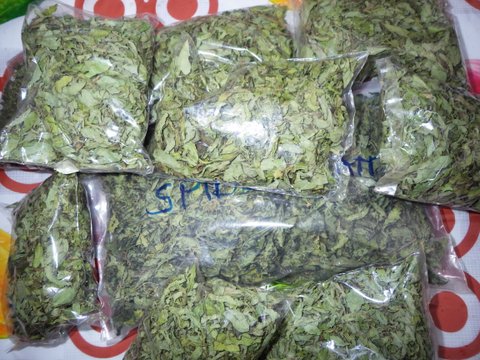
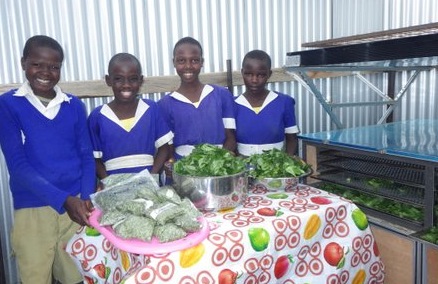
As part of their School Outreach Program they are drying African Leafy Vegetables (ALVs) that include Amaranth, Black Night Shade, Crotolaria, Jute Mallow, Spider Planter. These are the vegetables whose supply is very low during the dry season, but they are high in micro-nutrients, have medicinal benefits and are resistant to pests and diseases.
As a strategy to promote the consumption of dried vegetables, they are intensifying drying during the rainy season when the supply of the vegetables is high and packaging for storage and distribution during the dry season when supply is highly depressed. The dried vegetables will be distributed to parents, children and farmers during the dry period.
TSBF 2007/2009
Six VitaGoats and one SoyCow are operational in a program sponsored by TSBF, at projects in Western Kenya near Eldoret. Collaboration with Minstry of Agriculture is to stimulate soybean growing and processing with 300 small farmers, and improve nutrition with soymilk and yogurt.
This project is also in collaboration with "Western Appropriate Technology", a local organization which implements and supports technical development and training for farmers and agricultural processors.
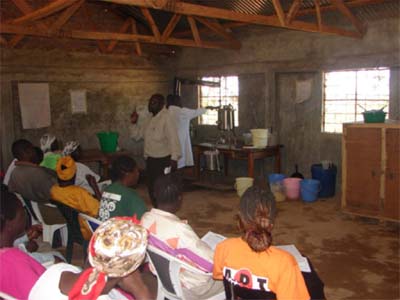
Classroom training session with the VitaGoat
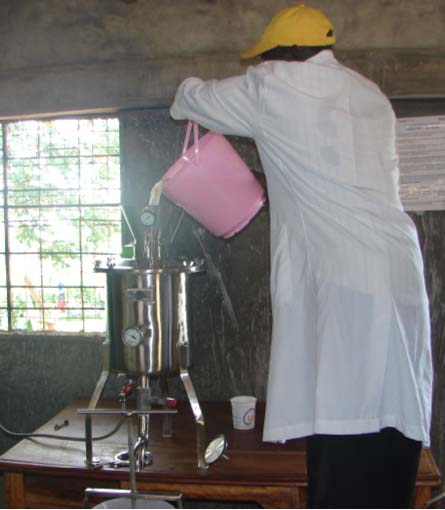
Loading VitaGoat cooker at project near Eldoret, Kenya.
AMPATH, Eldoret TSBF - CIAT, Kenya, April 2007

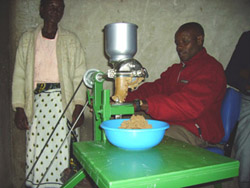
This photo shows peanut butter being made by the cycle grinder component of the VitaGoat. Project is intended to provide employment and nutrition for people living with HIV/AIDS. Eldoret is a leading agricultural area of Kenya with highly successful farms while also populated by a high percentage of people living with HIV/AIDS.
The NGO partner, Academic Model for the Prevention and Treatment of HIV/AIDS (AMPATH) is one of Kenya's most comprehensive initiatives to combat HIV. AMPATH is a working model of urban and rural HIV preventive and treatment services in the public sector. AMPATH cares for more than 17,000 HIV infected adults and children, with nearly one-half of all patients on anti-retroviral drugs. AMPATH has implemented programs that foster food and economic security for HIV infected persons and their families. AMPATH demonstrates the power of US and African academic medical centers united by common vision.
KwaZulu Natal REDI Network, South Africa, March 2007
South Africa 
Tugela Ferry Project, KwaZulu Natal,
Aug. 2008 Sponsored by Lutheran Church of Minnesota and WISHH
This area is very suitable for production of soya to use with the VitaGoat food processing system. The system enables the people of this community to have access to affordable and sustainable nutrition. This facility currently looks after approximately 65 day care children as well as children attending the facility for after school care and food provision.
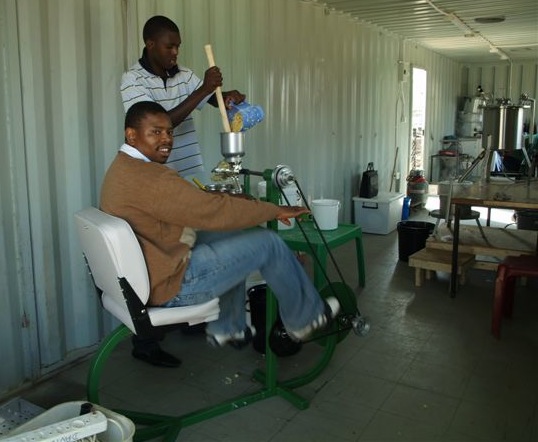
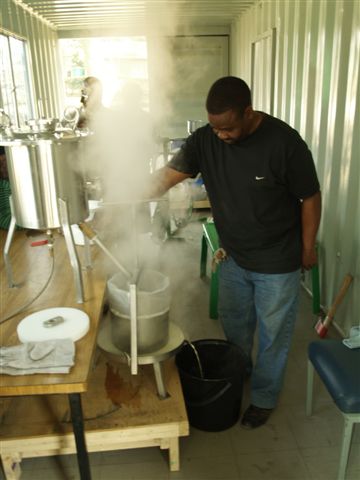
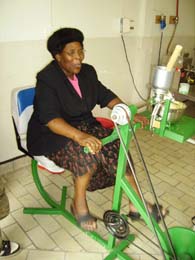
In KwaZulu Natal, South Africa, the REDI Network, (Rural Enterprise Development Initiative), with the support of Henry and Estelle Davies of Eden Foods, are leading the introduction of VitaGoat and SoyCow technology and project development for the region. The Davies are developing a training, service and tech center for the southern Africa region
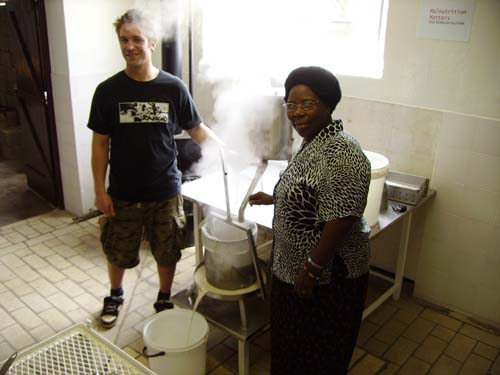
Mrs. Mchunu, is a member of the South African National Government, Inkatha Party, and is also known as "Mama Soya", since she is such a strong advocate for soyfoods for South Africans. She is shown grinding the soya mash on the VitaGoat cycle grinder, and with Charles Lauzon of Malnutrition Matters, producing soymilk during a training session. She drove for more than three hours by herself in a pickup truck to get to the demo.
Zambia 
Chikumbuso Women's Cooperative - Lusaka, Zambia Jointly supported by World Vision and Africare

Tofu fritters being proudly presented for sampling!
Soymilk, tofu and fried tofu products are made in this project at a poor inner-city location. Peanut butter is also prepared with the cycle grinder of the VitaGoat.
All Kids Can Learn
Africare Project, Zambia, March 2007
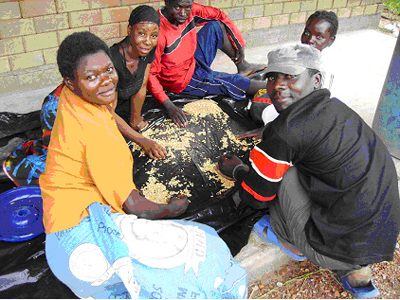
Soybeans are being cleaned before food preparation. Simple farming often yields soybeans with small stones and debris which must be separated.
All Kids Can Learn (AKCL), is located in a small community, one hour from Lusaka, Zambia. It is a multi-faceted local NGO, which works with orphans and vulnerable children, particularly those affected by AIDS. It is supported by various Zambian organizations and MM partner Africare, as well as US - based volunteers who manage the project.
Teenagers and young adults are being trained in agriculture, equipment service, technical skills and now the operation of a VitaGoat. This project is being developed to become a local and regional training and service center for the technology, while its general operation is also being used to supply food to AKCL and for sale in the local community.
Guinea 
January 2004 Field Project Report
This report describes the installation of the first pilot system in Guinea and assesses the technical and business potential of the system in an African context.
The selected location in Guinea is in Dinguiraye, about 500 km northeast of the capital, Conakry. There are about 30,000 people in the community. Dinguiraye has all the elements of a good VitaGoat location: no electricity, sporadic water availability and remoteness from major markets.
A variety of different foods was processed with the system including:
- corn meal and corn flour
- sorghum flour
- peanut butter (or "paste")
- tomato puree and juice
- mango puree and juice
- soymilk
- tofu
- sour soymilk ("lait caill")
- ground roasted soybeans (soya coffee)
- shea nut paste (used to make shea nut butter -used in confectionary
and cosmetic products in the West)
The products deemed to have the most economic potential (and happily, with a potentially large impact on nutritional status of consumers) were the soyfoods (soymilk, tofu and sour soymilk), the sterilized fruit purees (mango, papaya, etc) and shea nut butter. The soya “dairy” cost analysis was quite revealing, showing that soymilk products could be sold for about a half to a third the price of equivalent dairy products (when they are available), and still provide a healthy profit (50-75%) for the group.
Here is a brief illustrated montage of the VitaGoat experience in Guinea:
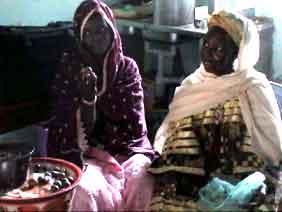
These women have been processing shea nuts into "butter" for most of their lives (shea is known as "karit" in French West Africa). This butter is much sought after in the West, where it is used in cosmetics and chocolate making. The VitaGoat grinder made grinding the nuts into a paste much easier and faster, leading the women to remark that this system would greatly improve their lives.

This woman is grinding roasted soybeans to make soya "coffee" - a popular drink in some regions of West Africa. The VitaGoat grinder made the grinding much easier than using manual methods and the quality of the grind and flavour of the coffee was praised by all.
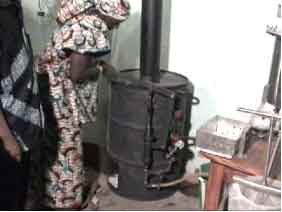
This woman is grinding roasted soybeans to make soya "coffee" - a popular drink in some regions of West Africa. The VitaGoat grinder made the grinding much easier than using manual methods and the quality of the grind and flavour of the coffee was praised by all.
Chad 
April 2004 Field Project Report
This report describes the installation of the third pilot system in Chad and assesses the technical and business potential of the system in an African context.
The VitaGoat was installed in Doba in the South of Chad, in the oil-producing region. Doba is a city of over 200,000 inhabitants situated 400 km (250 mi) south of the Chadian capital, N'Djamena. The selected partner group was a mix of 12 investor/partners. Each of the members of this 'VitaGoat cooperative' had each contributed about US$60 towards the set-up and purchase or raw materials for training. The funds for the building were covered by local investors, and the balance of funds required to purchase and ship the equipment was loaned by Africare.
Stay Up to Date
Questions?
Request more information from matters@malnutrition.org
© 2020 Malnutrition.org | Malnutrition Matters. All Rights Reserved.
